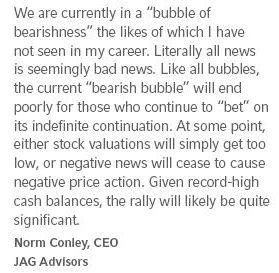- Posts: 951
- Thank you received: 19
 NextInsight
a hub for serious investors
NextInsight
a hub for serious investors
The end of the downturn will come....
- Dongdaemun
- Topic Author
- Offline
- Platinum Member
-

Less
More
17 years 2 months ago #838
by Dongdaemun
The end of the downturn will come.... was created by Dongdaemun
i was reading The Edge\'s article on Noble. The boss Richard Elman said somethng that sounded so true: 1. \"it is very difficult to judge how long the credit crunch and global financial turmoil will last. These are exceptional times and extraordinary things can happen. the recession could last six months, a year, who knows, even 18 months. But I can tell you this: it will end and things wll rebound. the key for us to stay afloat to take advantage of the next upturn.\" 2. \"Inventories of commodities have been drawn down. There is very little in the pipeline. when the demand does turn up, people will rush to grab whatever they can, from wherever they can. Suddenly, you will see a hockey stick-like uptick in commodity prices. Beleive me, we\'ve seen this movie before.\"
Please Log in to join the conversation.
17 years 2 months ago #857
by MacGyver
Replied by MacGyver on topic Re:The end of the downturn will come....
Yup... Fully agreed. But I also got one quote to tell everybody.. \"In the long run, everybody is a dead man...\" Just whether you got the resources to last the winter... Hence, better keep the wood and mountain ready for the winter. :laugh: :laugh:
Please Log in to join the conversation.
- ct.leong
- New Member
-

Less
More
- Thank you received: 0
17 years 2 months ago #861
by ct.leong
Replied by ct.leong on topic Re:The end of the downturn will come....
Please Log in to join the conversation.
- Dongdaemun
- Topic Author
- Offline
- Platinum Member
-

Less
More
- Posts: 951
- Thank you received: 19
17 years 2 months ago #869
by Dongdaemun
Replied by Dongdaemun on topic Re:The end of the downturn will come....
Peopleââ¬â¢s ââ¬Åbelief-systemsââ¬Â can be quite rapidly be changed by one off events ââ¬â but while such a change can happen overnight the memory of that event will also continue to affect behavior for a period of time after it ââ¬â and the extent to which behavior is changed only gradually diminishes as the memory of the event fades. The practical upshot of this is, we believe, that an event or market shock can impact investors risk perception overnight: however if this shift means nonnatural holders of equity start selling, once the decision to sell is made the selling itself will be relatively indiscriminate: sell what you can of what you own! Once the sell-off is over, people\'s risk perception does not immediately revert to its previous level ââ¬â the memory of the sell-off and the events that triggered it continue to resonate. This (not too subtly) impacts what people look to buy: investments that require generally more extreme growth outcomes continue to look more challenging. Thus, it is maybe not surprising to find that in recoveries, and contrary to perception, valuation strategies also do very well ââ¬â as investors initially look to buy sound businesses on very appealing valuations. - Citigroup report
Please Log in to join the conversation.
Time to create page: 0.213 seconds
